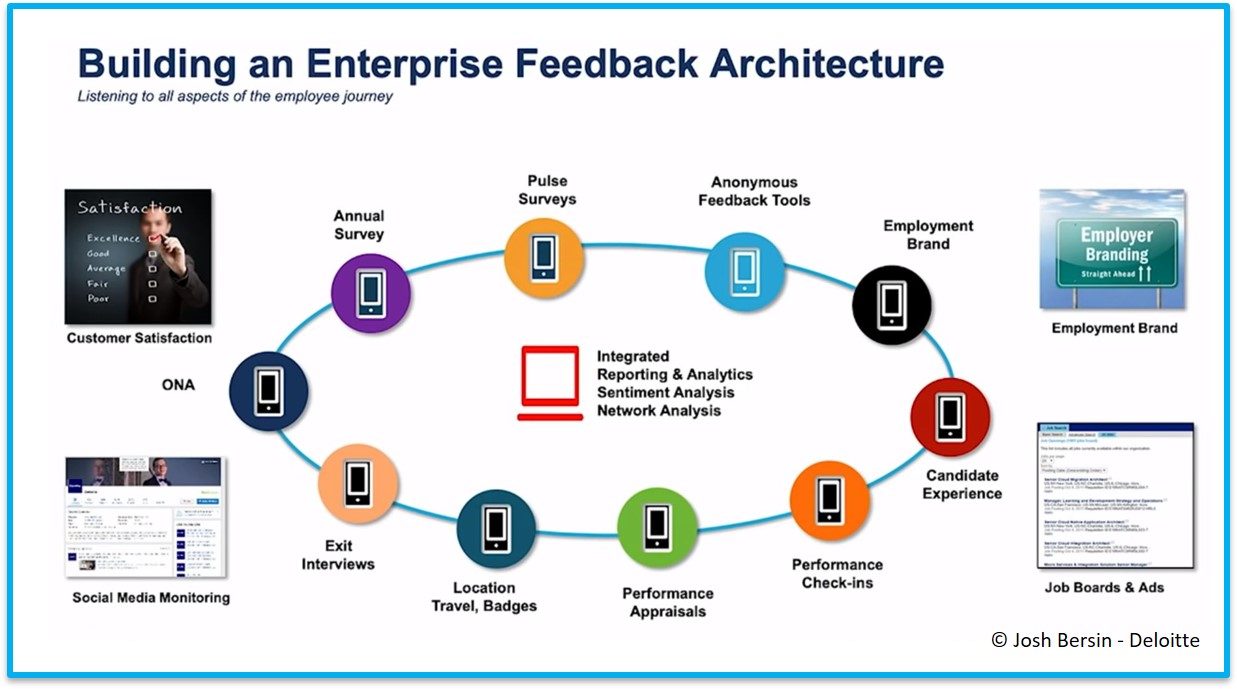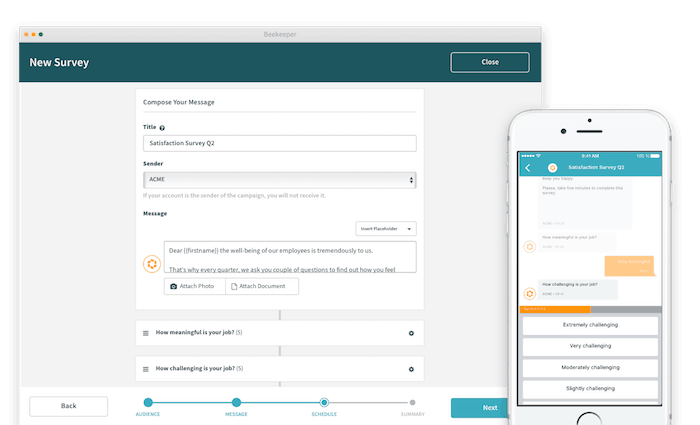"The more you know, the more you think you don’t. The more you don’t know, the more you think you do." - inspired by Aristotle and Albert Einstein
As a leader you need feedback from your team to succeed.
Collecting employee feedback regularly and frequently through employee surveys is an essential part of assessing internal communication strategies, operational efficiencies, and improving workplace culture.
Companies are now turning to employee surveys to gain organizational insights they can take immediate action on. Best of all, there are now ways to collect the feedback you need to make concrete improvements in real-time.
Depending on your company culture and the level of psychological safety you can now decide whether the survey is in a form of a public poll of multiple choice questions, a pulse survey with only a few questions, a personalized confidential survey, or a personalized 100% anonymous survey.
Beekeeper offers great flexibility to utilize one single App with the right survey types for the right use case and objective. It truly covers all the aspects of a comprehensive enterprise feedback architecture.

For businesses with a high number of mobile workers, conducting employee surveys with digital workplace apps is an effective way to measure workplace engagement, obtain employee feedback, and improve internal communication.
You can segment your target audience, understand diversity, break down silos, invite people from all corners of your organization for their inputs, and then value opinions across all levels.
As ISO 9001 states, people at all levels are the essence of an organization and their full involvement enables their abilities to be used for the organization’s benefit.
But what should you ask them in those surveys?
Here are the 10 best questions to ask your mobile workforce in employee surveys using a digital workplace app to improve staff communication, workforce productivity, and workplace engagement.
1. Do you feel like your immediate manager cares about you?
Employees don’t quit companies, they quit managers. Since mobile workers don’t reside in an office surrounded by peers on a daily basis, they can feel isolated. This question is a good way to find out if there are staff communication issues between mobile workers and management.
2. How would you rate your department’s performance?
Employees are used to receiving regular feedback on their performance and should get the opportunity to provide feedback pertaining to their department. Combined with the first question, you’ll get a good understanding of the relationship between staff and management, and maybe even uncover other communication challenges in the workplace.3. Do you understand how your role affects the company as a whole?
Mobile workers frequently feel out of the loop when it comes to company communication. Asking for employee feedback will assess whether or not your company has an effective team communication strategy, and will help gauge if your mobile workforce understands the importance of their roles. Positive replies to this answer indicate that the employees knows their purpose and why their job exists.4. Has someone from our company (other than your direct supervisor) communicated with you in the last week?
Unfortunately, the majority of mobile workers believe they don’t receive enough company communication while on the job. Mobile workers should be hearing from more than just their direct supervisor on a consistent basis. Information and knowledge should be shared openly within the company and not just with those who have a corporate email address or access to the Intranet.
In uncertain times, leaders can shy away from communication. Many prefer to postpone any communication until the dust has settled. However, both of these tendencies only increase anxiety among employees.
5. Do you know what our company values are?
Engaged employees can easily answer “yes” when posed with the following question: "Do you know what our company stands for and what makes our brand different from our competitors?" Since frontline employees are typically customer-facing, aligning internal communications with that of your mobile workforce is imperative. Mobile workers and frontline employees should know the company values inside and out, and also model them for your customers. The better frontline employees know what the company stands for the better they can tell your clients.6. Are you friends with any of your coworkers?
It can be difficult for mobile workers to bond the same way office employees do since their work environment and circumstances are less consistent. Having meaningful employee connections in the workplace can boost employee engagement and satisfaction by 50%! In fact, there are actually few things that matter more to our job satisfaction than whether we have friends at work (Gallup has proven it).7. How would you rate the performance of your coworkers?
Understanding how employees relate to and communicate best with their colleagues is helpful, but you also need employee feedback regarding the entire team’s productivity and performance. Alternatively you may want to ask "The people I work with most closely are committed to producing top quality work".8. Do you believe you have the opportunity for growth at our company?
While you may envision opportunities for your colleagues, they may not see it themselves and may not be incentivized to stick around. If they can’t see a growth path at your organization, they’re likely to find it somewhere else. But while most employees say career advancement and being challenged is important, but a smaller number are actually satisfied with how their company addresses their career goals.9. Would you recommend our company’s products or services to your friends and family?
If your frontline employee’s answer is no, solicit employee feedback find out why. Your team members can be your best brand ambassadors, but they have to believe in who they work for. Reputation management starts internally not externally.
10. Do you enjoy your role?
This is the most important question you can ask. Not every job can be fun 100% of the time, but a reliable, engaged mobile workforce can make even the most mundane task enjoyable. At the end of the day, a lot of our identity comes from work. And if we don’t do something that we truly enjoy, we are not going to truly take value from it nor deliver value to it.
Bonus Question (highly recommended to ask only in an anonymous survey)
11. What would you like to tell your boss but are afraid to share?
This simple question can turn silence into insights. There are a lot of things that employees are thinking, but wouldn’t ever dare to tell their bosses face to face. Whatever the reason, how can leaders fix a problem if they don’t even know it exists? They would need to rely on rumors, gossip, anecdotes, or insincerity. Not ideal nor desirable. Speaking up is vital to a healthy, functioning social system – whether that’s a nation, family, or company. This ultimate question enables leaders to finally listen to the powerful voices of quiet people.
Some important pointers to keep front of mind for all surveys:
1. Shoot for a 70% response rate
2. Indicate what you plan to do with your results
3. Keep it short
4. Act on your results
The key to a successful employee survey is follow-up. Once you have the answers to your questions, act on the insights you learn and make concrete plans for improving workplace culture.
You can gauge how successful your internal communication and employee engagement efforts are by administering another employee survey a couple months later and see how employee feedback compares. Digital workplace solutions like Beekeeper can save you valuable time through features such as automated employee survey chatbots.
With more regular bite-sized surveys you gather enough data points to plot a proper trend line that tells you where you are heading.

The above mentioned real-time communication and immediate feedback features make the Beekeeper team communication app an increasingly fundamental part of daily operations by serving as a hub for internal team communication, empowering employees, mobile communication, and providing management with data-driven insights.
The most effective transformations happen from the inside-out.
Are you interested in improving the way you collect feedback from your employees?
Get in touch with us to find out more about Beekeeper. We’ll be more than happy to show you how you can reach and engage your field employees, as well as collect feedback from them in a simple and secure way:



